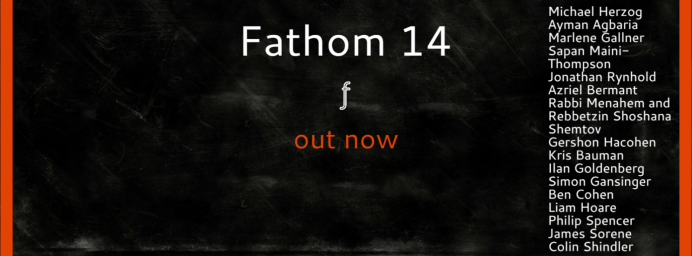Fathom 14 examines four challenges facing Israel: the challenge of creating a shared society, of creating a security system for the two-state solution, of responding to Brexit, and of understanding and combatting the historical tributaries, contemporary forms and damaging political impacts of the ideology of anti-Zionism.
First, with President Rivlin raising the alarm about the danger of Israel fragmenting into ‘four tribes – secular, national-religious, ultra-Orthodox and Arab – what are the obstacle’s to closing the gaps between Israel’s majority and its minorities and how can they be overcome?
Rabbi Menahem Shemtov is the coordinator of the ultra-Orthodox programme at the Citizens’ Accord Forum (CAF) and Rebbetzin Shoshana Shemtov is the project coordinator of CAF’s ultra-Orthodox women’s group. They spoke to Fathom about the work of CAF among the Arab community and the ultra-Orthodox community for a sustainable democracy in Israel. They also addressed patterns of discrimination experienced by the ultra-Orthodox and Israel’s urgent need to integrate: ‘We now know that the future of Israel is the ultra-Orthodox population. We are going to be a majority twenty years from now. Out of responsibility, we need to take care of the future of the State of Israel.’
Ayman Agbaria is a Palestinian poet, playwright, and senior lecturer in education policy and politics at the University of Haifa. He spoke to Fathom about the controversy surrounding Israel’s new civics textbook – ‘it erodes the civic foundation of the State that one day could be, but is not currently, shared between the Palestinian minority and the Jewish-Israelis’ – and mapped the obstacles to the Arab-Palestinian minority achieving equality in Israel.
Reem Younis is the co-founder of Nazareth-based Alpha Omega, a global high-tech company that seeks to further high-tech skills, employment and entrepreneurship among Israel’s Arab citizens. She argues for a new sensibility to the Arab minority and to Israel’s periphery in order to boost the employment of Arabs in the high-tech sector: ‘The trend is changing, but not at the pace needed for Arab graduates.’
Dalia Fadila is a Muslim woman who became the first female dean of an Islamic college in Israel. To advance Arab society, she opened her own set of schools in Israel: Q Schools. She explains how while learning English, the students also acquire progressive values and become citizens of the world, empowered personally and intellectually.
Liam Hoare reviews Amos Oz’s new novel Judas, which in its way concerns another minority in the figure of Oz’s character Shmuel Ash, ‘a stocky bearded young man of around twenty-five, shy, emotional, socialist, asthmatic, liable to veer from wild enthusiasm to disappointment and back again.’ While Israel Hayom responded to what is after all an event – a new book from Israel’s most famous novelist – with the thuggish headline ‘it takes a Judas to know one’, Hoare offers a kinder, gentler but rather more insightful appreciation of ‘a novel of questions as much as it is a novel of ideas, which asks what it means to be a traitor and what it does to those who suffer when branded with this marker’.
Second, what would a security system for the two-state solution between Israelis and Palestinians look like?
In a symposium about the Center for New American Security (CNAS) report Advancing the Dialogue: A Security System for the Two-State Solution, we have three expert analyses that command our attention.
First Colonel Kris Bauman is Senior Military Fellow at the Institute for National Strategic Studies (INSS) at the National Defence University and in 2013-2014, worked as Chief of Staff for the Senior Advisor to the Secretary of Defence, General John R. Allen. Ilan Goldenberg is Director of CNAS Middle East Security Program and Former Chief of Staff to the Special Envoy for Israeli-Palestinian Negotiations. They explain how their paper builds on previous work in negotiations and aims to provide a starting point for further discussion and refinement in order to resolve the security component of final status discussions between Israelis and Palestinians. Amongst other things, they are guided by the challenge of preventing the West Bank from going the way of Gaza after Israel’s withdrawal in 2005.
Second, Major General (Res.) Gershon Hacohen disagrees with the accepted wisdom regarding the effectiveness of barriers, suggesting that there is no substitute for troops on the ground and cautioning against an Israeli withdrawal from the West Bank. He ultimately concludes that a Palestinian state would inherently undermine Israel’s security.
Third, as an official involved in most of the negotiations between Israel and the Palestinians over the last 15 years, Brigadier General (Res.) Michael Herzog is an expert on Israeli security concerns and interests. In this article he gives his views on the CNAS report and Israel’s security concerns in final-status discussions. He argues that even though each of Israel’s security requests look solvable when taken in isolation, it is difficult to overcome their accumulating effect on limiting Palestinian sovereignty and thus recommends deeper involvement by Egypt and Jordan in security arrangements and designing a broader regional security architecture.
Also in this issue, we have three outstanding reflections on issues of war and terrorism and the West’s response.
Fathom advisory editor Ben Cohen explores the Obama administration’s masterful success in persuading so many American influencers to buy into a delusion about Iran – that it is a state we can do business with because it is pursuing its reasonable national interests within a framework of internationally agreed principles, embracing a previously hidden sense of civic responsibility towards ordinary Iranians alongside its newly-boosted political and military influence. Successful the communications strategy has been, but delusion it is, nonetheless Cohen insists. Moreover, he warns, what started as a delusion has now become a strategic point of departure, and there may yet be real-world victims of this administration’s communications success.
Shiraz Maher is the author of Salafi-Jihadism: The History of an Idea and a senior research fellow at the International Centre for the Study of Radicalisation at King’s College London. His expert mapping of contemporary Salafi-Jihadism is a perfect introductory guide. He discusses the three forms it takes today (quietist, reformist, jihadist), its non-normative interpretation of the foundational theo-political concepts of Jihad, Takfir, Tawhid, al-wala wal-bara, and al-hakimiyya, and the origins of contemporary Salafi-jihadism in the post 9/11 conjuncture.
James Sorene offers an astute reading and a moving personal reflection on Matti Friedman’s widely praised book Pumpkinflowers: A Soldier’s Story.
Third, after the earthquake of Brexit, what lies ahead for Israel-UK relations and Israel-EU relations?
Both Jonathan Rynhold and Azriel Bermant – Brits who are now Israelis – assess that while the blow to Euro-federalism might benefit Israel, and judge the UK-Israel relationship to be ‘stronger in terms of political, diplomatic and military cooperation than is the multilateral relationship between the EU and Israel’. They are both less sanguine about the prospects for Israel-EU relations if the counsels of the UK, often the most understanding of Israel’s security challenges and the most likely to propose balance in the carrots and sticks offered to the two parties by Europe, are removed permanently from the European discussion.
Fourth, with the British Labour Party investigating antisemitism in its ranks are we sufficiently aware of the historical sources of anti-Semitic anti-Zionism, of the violent historical episodes in the recent past of the left, of the prophetic voices raised against it in Europe, of the damage done to peace by its practical expression in the form of the BDS movement, or of the striking theoretical affinities between todays’ left-wing anti-Zionism and reactionary Islamist ideas?
Fathom is always on the look-out for new writers and we are proud to publish three bright new talents in this issue.
Jean Améry is best known in the anglophone world as a Holocaust survivor and author of At The Mind’s Limits, an Auschwitz memoir hailed by the critic Irving Howe as ‘the testimony of a profoundly serious man’. But in the 1960s he was also the outspoken left-wing critic of left-wing antisemitism in Western Germany and it is this Améry who Marlene Gallner’s important essay makes available to us as a moral and intellectual resource today.
Simon Gansinger tells the story of the left-wing anti-Zionist campaign that destroyed Poland’s Jewish community. ‘Everything started collapsing then’, wrote Halina Zawadzka, who survived the Shoah in Poland, about her experience of 1968 in Communist Poland when dozens of Jews committed suicide after they had found themselves publicly vilified and socially isolated, denounced as a ‘fifth column’ by Władysław Gomułka, the first secretary of the Polish United Workers Party. 8,300 members were expelled from the Communist party, nearly all Jewish. 9,000 Jews lost their jobs, some were beaten up and hundreds were thrown out of their apartments.
Not so young, but steeped in an experience they bring to their writing about contemporary anti-Zionism and antisemitism are Michael Yudkin and Philip Spencer.
‘Academic boycott’ is now a term of art to describe a means of punishing Israeli academics for the actions of a government over which they have little or no power, claims the Oxford University academic Michael Yudkin. Putting the Palestinian Campaign for the Academic and Cultural Boycott of Israel (PACBI) and its UK partner is the British Committee for the Universities of Palestine (BRICUP) under the spotlight, Yudkin finds that not only do they contradict the fundamental academic principle of universality’ but their true purposes are much more radical than their stated aims suggest.
Philip Spencer writes in praise of Dave Rich’s ‘lucid and compelling’ book The Left’s Jewish Problem: Jeremy Corbyn, Israel and Anti-Semitism.

































